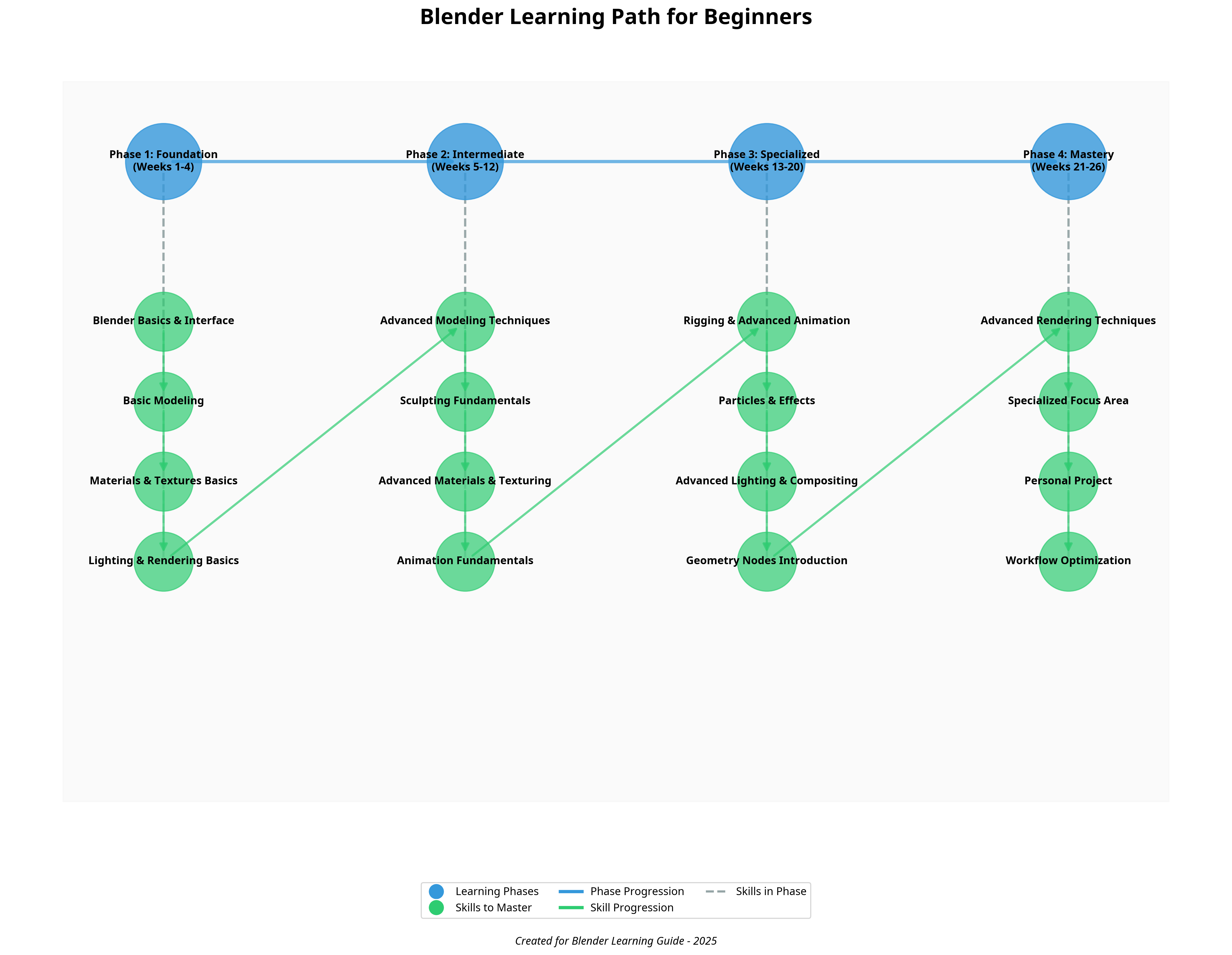Complete Blender Learning Roadmap
A comprehensive, step-by-step guide to mastering Blender from beginner to advanced level
Your Learning Journey
This roadmap provides a structured learning path for mastering Blender, broken down into four progressive phases. Each phase builds upon the skills learned in the previous one, taking you from complete beginner to advanced user.
The roadmap includes realistic time estimates, but remember that everyone learns at different paces. Feel free to adjust the timeline to suit your learning style and available time.
Learning Path Visualization

Skill Progression
This radar chart shows how your skills will develop across different areas of Blender as you progress through the learning phases:

Detailed Learning Roadmap
Phase 1: Foundation (Weeks 1-4)
Week 1: Blender Basics & Interface
Estimated time: 7-10 hours
Day 1-2: Getting Started
- Installing and setting up Blender 4.4
- Understanding the Blender interface
- Customizing your workspace
- Navigation basics (orbit, pan, zoom)
- Setting up preferences
Day 3-5: Basic 3D Viewport Operations
- Selection tools and methods
- Transform tools (move, rotate, scale)
- Object vs. Edit mode
- Using the 3D cursor
- Basic shortcuts for efficiency
Day 6-7: First Simple Project
- Creating primitive objects
- Basic object manipulation
- Simple scene arrangement
- Basic viewport shading options
- Saving and organizing your work
Week 2: Basic Modeling
Estimated time: 8-12 hours
Day 1-3: Mesh Fundamentals
- Understanding vertices, edges, and faces
- Edit mode tools
- Extrude, inset, and bevel operations
- Loop cuts and knife tool
- Basic mesh editing workflow
Day 4-5: Modifiers Introduction
- Understanding the modifier stack
- Essential modifiers (Subdivision Surface, Mirror, Array)
- Non-destructive workflow concepts
- Applying modifiers
Day 6-7: Simple Modeling Project
- Creating a simple household object
- Applying learned modeling techniques
- Problem-solving common modeling issues
- Refining your model
Week 3: Materials & Textures Basics
Estimated time: 8-10 hours
Day 1-2: Material Fundamentals
- Understanding the Material properties panel
- Creating and assigning basic materials
- Adjusting color, metallic, and roughness properties
- Material preview options
Week 4: Lighting & Rendering Basics
Estimated time: 7-10 hours
Day 1-2: Lighting Fundamentals
- Types of lights in Blender
- Three-point lighting setup
- Adjusting light properties
- Understanding shadows and bounced light
Phase 2: Intermediate Skills (Weeks 5-12)
In this phase, you'll build on your foundation with more advanced techniques in modeling, sculpting, materials, and animation.
Key Focus Areas:
- Advanced modeling techniques (Weeks 5-6)
- Sculpting fundamentals (Weeks 7-8)
- Advanced materials & texturing (Weeks 9-10)
- Animation fundamentals (Weeks 11-12)
Phase 3: Specialized Skills (Weeks 13-20)
Develop specialized skills in rigging, effects, advanced lighting, and geometry nodes to expand your capabilities.
Key Focus Areas:
- Rigging & advanced animation (Weeks 13-14)
- Particles & effects (Weeks 15-16)
- Advanced lighting & compositing (Weeks 17-18)
- Geometry nodes introduction (Weeks 19-20)
Phase 4: Mastery & Specialization (Weeks 21-26)
Achieve mastery through advanced techniques, specialization in your chosen area, and complete projects.
Key Focus Areas:
- Advanced rendering techniques (Weeks 21-22)
- Specialized focus area (Weeks 23-24)
- Personal project & workflow optimization (Weeks 25-26)
Learning Tips for Success
Practice consistently
Even 30 minutes daily is better than occasional long sessions.
Follow along with tutorials
Don't just watch; actually do the exercises.
Join Blender communities
Reddit r/blender, Blender Artists forums, Discord groups.
Take breaks when frustrated
Sometimes stepping away solves problems.
Document your progress
Keep a log of what you've learned and screenshots of your work.
Complete projects
Finish what you start before moving to new projects.
Adjusting the Timeline
This roadmap provides estimated timeframes, but everyone learns at different paces. Feel free to:
- Spend more time on areas you find challenging
- Move more quickly through concepts you grasp easily
- Revisit earlier sections when needed
- Take breaks between phases to consolidate knowledge
The most important factor is consistent practice and completing projects, not strictly adhering to the timeline.
Ready to Begin Your Blender Journey?
Start with Phase 1 resources and take your first steps toward Blender mastery.
Start Phase 1: Foundation